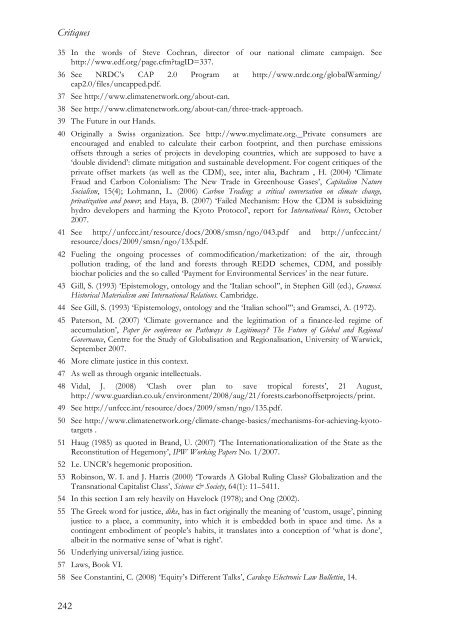Upsetting the Offset - Transnational Institute
Upsetting the Offset - Transnational Institute
Upsetting the Offset - Transnational Institute
Create successful ePaper yourself
Turn your PDF publications into a flip-book with our unique Google optimized e-Paper software.
Critiques<br />
35 In <strong>the</strong> words of Steve Cochran, director of our national climate campaign. See<br />
http://www.edf.org/page.cfm?tagID=337.<br />
36 See NRDC’s CAP 2.0 Program at http://www.nrdc.org/globalWarming/<br />
cap2.0/files/uncapped.pdf.<br />
37 See http://www.climatenetwork.org/about-can.<br />
38 See http://www.climatenetwork.org/about-can/three-track-approach.<br />
39 The Future in our Hands.<br />
40 Originally a Swiss organization. See http://www.myclimate.org. Private consumers are<br />
encouraged and enabled to calculate <strong>the</strong>ir carbon footprint, and <strong>the</strong>n purchase emissions<br />
offsets through a series of projects in developing countries, which are supposed to have a<br />
‘double dividend’: climate mitigation and sustainable development. For cogent critiques of <strong>the</strong><br />
private offset markets (as well as <strong>the</strong> CDM), see, inter alia, Bachram , H. (2004) ‘Climate<br />
Fraud and Carbon Colonialism: The New Trade in Greenhouse Gases’, Capitalism Nature<br />
Socialism, 15(4); Lohmann, L. (2006) Carbon Trading: a critical conversation on climate change,<br />
privatization and power; and Haya, B. (2007) ‘Failed Mechanism: How <strong>the</strong> CDM is subsidizing<br />
hydro developers and harming <strong>the</strong> Kyoto Protocol’, report for International Rivers, October<br />
2007.<br />
41 See http://unfccc.int/resource/docs/2008/smsn/ngo/043.pdf and http://unfccc.int/<br />
resource/docs/2009/smsn/ngo/135.pdf.<br />
42 Fueling <strong>the</strong> ongoing processes of commodification/marketization: of <strong>the</strong> air, through<br />
pollution trading, of <strong>the</strong> land and forests through REDD schemes, CDM, and possibly<br />
biochar policies and <strong>the</strong> so called ‘Payment for Environmental Services’ in <strong>the</strong> near future.<br />
43 Gill, S. (1993) ‘Epistemology, ontology and <strong>the</strong> ‘Italian school’’, in Stephen Gill (ed.), Gramsci.<br />
Historical Materialism ami International Relations. Cambridge.<br />
44 See Gill, S. (1993) ‘Epistemology, ontology and <strong>the</strong> ‘Italian school’’’; and Gramsci, A. (1972).<br />
45 Paterson, M. (2007) ‘Climate governance and <strong>the</strong> legitimation of a finance-led regime of<br />
accumulation’, Paper for conference on Pathways to Legitimacy? The Future of Global and Regional<br />
Governance, Centre for <strong>the</strong> Study of Globalisation and Regionalisation, University of Warwick,<br />
September 2007.<br />
46 More climate justice in this context.<br />
47 As well as through organic intellectuals.<br />
48 Vidal, J. (2008) ‘Clash over plan to save tropical forests’, 21 August,<br />
http://www.guardian.co.uk/environment/2008/aug/21/forests.carbonoffsetprojects/print.<br />
49 See http://unfccc.int/resource/docs/2009/smsn/ngo/135.pdf.<br />
50 See http://www.climatenetwork.org/climate-change-basics/mechanisms-for-achieving-kyototargets<br />
.<br />
51 Haug (1985) as quoted in Brand, U. (2007) ‘The Internationationalization of <strong>the</strong> State as <strong>the</strong><br />
Reconstitution of Hegemony’, IPW Working Papers No. 1/2007.<br />
52 I.e. UNCR’s hegemonic proposition.<br />
53 Robinson, W. I. and J. Harris (2000) ‘Towards A Global Ruling Class? Globalization and <strong>the</strong><br />
<strong>Transnational</strong> Capitalist Class’, Science & Society, 64(1): 11–5411.<br />
54 In this section I am rely heavily on Havelock (1978); and Ong (2002).<br />
55 The Greek word for justice, dike, has in fact originally <strong>the</strong> meaning of ‘custom, usage’, pinning<br />
justice to a place, a community, into which it is embedded both in space and time. As a<br />
contingent embodiment of people’s habits, it translates into a conception of ‘what is done’,<br />
albeit in <strong>the</strong> normative sense of ‘what is right’.<br />
56 Underlying universal/izing justice.<br />
57 Laws, Book VI.<br />
58 See Constantini, C. (2008) ‘Equity’s Different Talks’, Cardozo Electronic Law Bullettin, 14.<br />
242
















